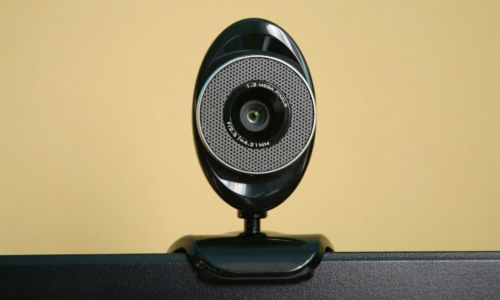The dilemma of online assessments: are students to be trusted or not?
-
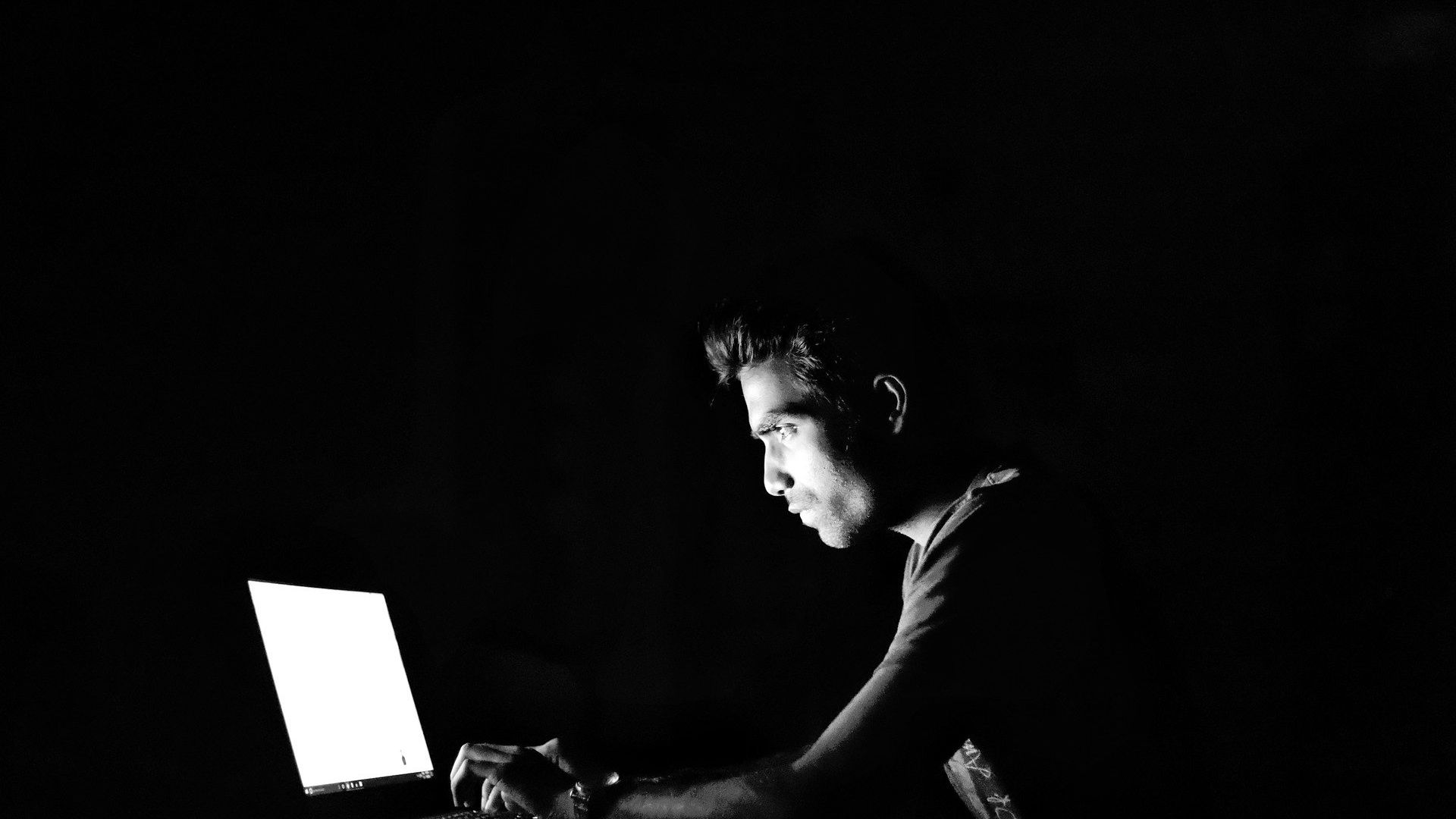 Via Pixabay
Via Pixabay
Later this month, Radboud University will be taking the decision on whether this year's final examinations going to be held by means of proctoring software. There is much resistance among students against this manner of remote invigilation, and the question is: what do lecturers think of this? Do they think an alternative is possible?
At the Faculty of Law, students have been assessed in a radically different manner since the breaking out of the corona crisis. Instead of sitting and sweating together with six hundred others in a lecture hall, they take the examination at home. Students open their laptop, log in, and start with the first questions. Their dear mothers might even have brought them a cup of tea.
This does not sound like anything special so far – has not all physical education been cancelled? What makes the law examinations a different matter, is that students are not supervised in any way. No invigilation by webcam, listening in through the microphone or even following the direction of the eyes by means of eye tracking, nothing of the kind.
‘All knowledge questions have been removed from the examination’
To prevent students from simply looking up the answers on Google or discussing assignments with each other on WhatsApp, the faculty has set up a new system. The original idea for this came from university lecturer Simon Tans, who developed it further with a team of education innovators. ‘I was only looking for a solution for my own course, but the faculty has chosen to use the method for the whole faculty.’
Time pressure
Tans does not want to go into the method too deeply – this increases the risk that students will try looking for gaps in the system. Basically, it boils down to participants not working at the same question at the same moment. The questions are shuffled and students cannot return to a previous question. That, together with a greater time pressure, makes it more difficult to cheat.

Are there, then, no snags to this method of assessment? Certainly, Tans does not hesitate to admit. ‘Students do not appreciate not being able to revisit an earlier question, for example. In addition, all knowledge questions have been removed from the examination – as students can quite easily look up the answers to those types of questions.’ According to Tans, this did decrease the quality of some first-year examinations.
But the ‘Tans method’ does make it possible for the Faculty of Law to avoid proctoring software. This type of online invigilation is controversial – the Dutch Socialist Party has asked parliamentary questions and, at Radboud University, a petition is circulating against using it, which has received more than a thousand signatures.
At the end of this month, the Executive Board will take a decision regarding the use of proctoring in the last examination period of this academic year. The pilot, in which software by Proctorio – a company that specialises in proctoring software – is being investigated has almost been concluded. Aspects that are being taken into account in the pilot are, among others, the privacy of students and whether the system is capable of detecting fraud.
WhatsApp group
A lecturer who can speak from experience about fraud is brain scientist Eric Maris. At the beginning of April – shortly after the start of the lockdown – first-year psychology students were taking a resit examination for one of his much-dreaded courses. On the day of the exam Maris had already received forwarded screenshots from a WhatsApp group in which questions were being discussed during the examination. Maris called in the Examining Board and the students who committed fraud have since been punished.
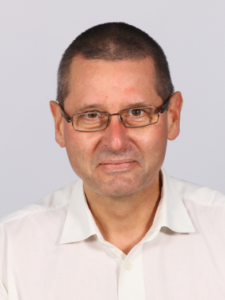
The examination was conducted by Maris using online proctoring. Students were being monitored via their webcam in Brightspace’s virtual classroom environment (the software by Proctorio was not yet available at the time). Although the method is not water-tight – which became apparent from the fact that the fraud came to light through a tip-off by students – Maris had little choice but to deploy proctoring. ‘It was a resit, and the examination regulations state that the assessment method must be the same as at the first chance, which had consisted of multiple-choice questions.’
Two hundred students
Yet, even apart from that, Maris did not see possibilities for an alternative manner of assessment, such as an essay assignment. ‘This is a basic subject for first-year students that is mostly about knowing. What are the properties of a neuron? How are signals transmitted to the brain? How does the link between sensory input and motor output work? Those sort of questions cannot be assessed by asking students an open question about a scientific or practical problem. These kind of assignments would come too soon for our first-year students.
‘Objectivity in appraisal is of great value’
Furthermore, this concerned two hundred students. ‘You can’t really just let them all take an oral examination or have them write an essay. At examinations I always offer them the opportunity for exam inspection. The more open a question, the more complex this inspection. According to Maris, that also means more discussion afterwards with the students. ‘They rightfully stand up for their own interests, but it cannot be so the case that the lecturer comes into a position in which their interpretation of a text is determinative for passing or not passing the examination. ‘Objectivity in appraisal is of great value’.
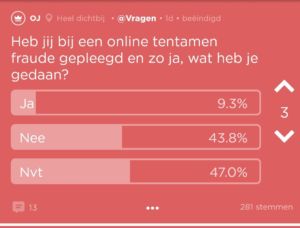 How many students commit fraud during online examinations? A poll on the anonymous community app Jodel, popular among students, gives a non-scientific indication. Of the 281 voters, more than 9 per cent admitted to having committed fraud at some time or other. 44 percent say that they have not. The remaining 47 percent chose ‘not applicable’.
How many students commit fraud during online examinations? A poll on the anonymous community app Jodel, popular among students, gives a non-scientific indication. Of the 281 voters, more than 9 per cent admitted to having committed fraud at some time or other. 44 percent say that they have not. The remaining 47 percent chose ‘not applicable’.
The fraud ascertained in April did result in a small discussion between Maris and the Examining Board. ‘My colleagues in the Examining Board do their work with great care, but I do not understand why the educational institution does not communicate the punishment of students who committed fraud to the rest of the university community. This can have an enormous preventive effect. Is it not also for this reason that court cases are mainly public in the Netherlands? Of course meetings of the Examining Board do not need to be public, but a careful communication of the consequences of fraudulent behaviour has nothing but advantages in my opinion.’
Trust
Where Maris focuses on making students aware of the consequences of acting with a lack of integrity, at universities and other educational institutions the cry is increasingly being heard to trust students instead of distrusting them. The Teaching and Learning Centre, which was recently set up at Radboud University, also stresses this.
‘We would like to develop assessment methods in which the focus is not on rules and control, but on respect and trust,’ the Centre writes in a vision document on assessment in times of corona.

That would mean an about-turn in times that lecturers are increasingly relying on ways of online invigilation. Since more and more scandals that involve researchers – with Diederik Stapel in the lead – have appeared in the media, attention to fraud and plagiarism among students is more often being placed under the magnifying glass, university senior lecturer Jochem Tolsma observes. ‘Not only from a negative perspective – “people are not to be trusted” – but also from positive perspectives – “let us help students to develop themselves into academics that have integrity.”
Sociologist Tolsma, however, agrees with the Teaching and Learning Centre, and pleads for ‘integrity and trust as vital building blocks for a good, instructive relationship between lecturer and student.’ Tolsma: ‘In examinations with a large group of students, where reproduction of knowledge is mostly required, proctoring can be an effective solution that does not demand too much of the lecturer’s time. But online proctoring is based on distrust instead of trust. Do we really want this to be the message we give our students?’
Equal chances
In Tolma’s view, proctoring should be deployed as little as possible. This might mean there will be a bit more cheating as a result, but he believes that the university will just have to accept that. Someone who has more difficulty with this is lecturer of Economics Jana Vyrastekova.
‘I find it very important to create an equal playing field for all students. It would be unfair towards the students who do wish to do their exam in an honest way, should everything be left free an uncontrollable. We ought to protect them from that.’
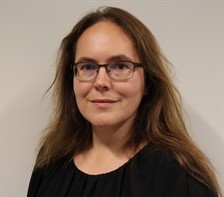
Vyrastekova herself held her exams in the previous examination period while watching her students through the webcam. ‘You can see quite easily which students are busy doing something different to the rest. You may not be able to prove anything, but it is about the rules being clear and that there is supervision. Students know what the intention is, and we do our best to offer everyone the same chances.’
And if there is, in spite of this, still a student who can find a way to cheat, then Vyrastekova can resign herself to it. ‘Then we have at least done our utmost to prevent that.’
Jochem Tolsma also points to another possibility. If there should be a suspicion of cheating or other improper behaviour afterwards, something can still be done about it. ‘Let us learn from a field of sports that was known to be rife with cheating: cycling. More and more online cycling races are being organised. If, during such a race, unrealistic wattages are suddenly being pedalled, participants have to prove afterwards that they can reproduce them in real life. We, too, can, in the rare case of suspicion of fraud, ask students to repeat the same “trick” at a later date.’
